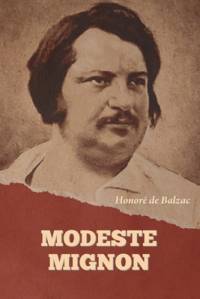Om Modeste Mignon
Modeste Mignon is a novel by the French writer Honoré de Balzac. It is the fifth of the Scènes de la vie privée (Scenes of Private Life) in La Comédie humaine.
The first part of the novel was serialized in a bowdlerized edition in the Journal des débats in April, May and July 1844. A revised and expanded version of the work was later published by Chlenowski in two parts under the titles Modeste Mignon and Les Trois amoureux (The Three Suitors). The third and final edition of the novel appeared in 1846 as part of Furne's complete edition of La Comédie humaine. Modeste Mignon was the third work in Volume 4, or the twenty-third of the Scènes de la vie privée.
Balzac wrote Modeste Mignon after returning to France from Saint Petersburg, where he spent the summer of 1843 with his future wife the Countess Ewelina Hańska, to whom the work is dedicated:
Daughter of an enslaved land, angel through love, witch through fancy, child by faith, aged by experience, man in brain, woman in heart, giant by hope, mother through sorrows, poet in thy dreams - to thee belongs this book, in which thy love, thy fancy, thy experience, thy sorrow, thy hope, thy dreams, are the warp through which is shot a woof less brilliant than the poesy of thy soul, whose expression, when it shines upon thy countenance, is, to those who love thee, what the characters of a lost language are to scholars.
In Saint Petersburg Balzac had read a French translation of the correspondence between the German poet Johann Wolfgang von Goethe and the young German Romantic Bettina Brentano, who was thirty-seven years his junior. This work, as well as Balzac's own correspondence with young admirers, clearly inspired Modeste Mignon, a novel whose plot hinges on the correspondence between a famous poet and a young female admirer of his work. Parallels have also been detected with Balzac's experiences in St Petersburg: there is much of Countess Hańska in the character of Modeste, while her father's cousin Wenceslas Rzewuski has been compared to Modeste's father Charles Mignon. (wikipedia.org)
About the author:
Honoré de Balzac born Honoré Balzac; (20 May 1799 - 18 August 1850) was a French novelist and playwright. The novel sequence La Comédie humaine, which presents a panorama of post-Napoleonic French life, is generally viewed as his magnum opus.
Owing to his keen observation of detail and unfiltered representation of society, Balzac is regarded as one of the founders of realism in European literature. He is renowned for his multi-faceted characters; even his lesser characters are complex, morally ambiguous and fully human. Inanimate objects are imbued with character as well; the city of Paris, a backdrop for much of his writing, takes on many human qualities. His writing influenced many famous writers, including the novelists Ãmile Zola, Charles Dickens, Marcel Proust, Gustave Flaubert, and Henry James, and filmmakers François Truffaut and Jacques Rivette. Many of Balzac's works have been made into films and continue to inspire other writers. James called him "really the father of us all."
An enthusiastic reader and independent thinker as a child, Balzac had trouble adapting to the teaching style of his grammar school. His willful nature caused trouble throughout his life and frustrated his ambitions to succeed in the world of business. When he finished school, Balzac was apprenticed in a law office, but he turned his back on the study of law after wearying of its inhumanity and banal routine. Before and during his career as a writer, he attempted to be a publisher, printer, businessman, critic, and politician; he failed in all of these efforts. La Comédie Humaine reflects his real-life difficulties, and includes scenes from his own experience. ... (wikipedia.org)
Visa mer

